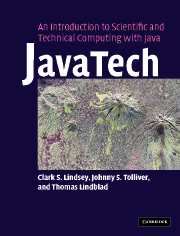Book contents
- Frontmatter
- Contents
- Preface
- Acknowledgements
- Part I Introduction to Java
- 1 Introduction
- 2 Language basics
- 3 Classes and objects in Java
- 4 More about objects in Java
- 5 Organizing Java files and other practicalities
- 6 Java graphics
- 7 Graphical User Interfaces
- 8 Threads
- 9 Java input/output
- 10 Java utilities
- 11 Image handling and processing
- 12 More techniques and tips
- Part II Java and the network
- Part III Out of the sandbox
- Appendix 1 Language elements
- Appendix 2 Operators
- Appendix 3 Java floating-point
- Index
- References
10 - Java utilities
Published online by Cambridge University Press: 08 January 2010
- Frontmatter
- Contents
- Preface
- Acknowledgements
- Part I Introduction to Java
- 1 Introduction
- 2 Language basics
- 3 Classes and objects in Java
- 4 More about objects in Java
- 5 Organizing Java files and other practicalities
- 6 Java graphics
- 7 Graphical User Interfaces
- 8 Threads
- 9 Java input/output
- 10 Java utilities
- 11 Image handling and processing
- 12 More techniques and tips
- Part II Java and the network
- Part III Out of the sandbox
- Appendix 1 Language elements
- Appendix 2 Operators
- Appendix 3 Java floating-point
- Index
- References
Summary
Introduction
Any language should come with a well-stocked toolbox of utilities to ensure programming efficiency and convenience. The Java core language, in fact, includes a large package named, quite sensibly, java.util that holds classes to handle arrays, hash tables, time keeping, and other common tasks. In this chapter, we focus mostly on this package but also discuss some handy tools in other packages such as String and StringBuffer in java.lang and StringBuilder and enum, that were added to java.lang for J2SE 5.0 [1, 2]. We also discuss the Collections Framework and the new Generics feature of J2SE 5.0.
We also look at classes and techniques for handling numbers at two extremes. For bits we have the java.util.BitSet class. For arbitrarily large numbers and for those that with very long decimal fractions we have the java.math. BigInteger and java.math.BigDecimal classes.
We can only briefly describe here the general workings of these classes, many of which contain a great number of methods. See the class descriptions in the Java 2 API Specifications for the full details.
The java.util Package
The package java.util has been part of the core language since Java 1.0. However, several classes have been added in subsequent versions. As the name suggests, the classes in this package serve a number of useful utility purposes, and we discuss several of them in this chapter.
- Type
- Chapter
- Information
- Publisher: Cambridge University PressPrint publication year: 2005



